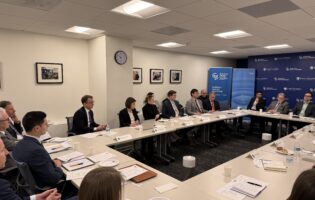Stabilizing the Euro Debt Crisis: A Positive Outlook for the Near Future
On August 20, 2013, AGI hosted a roundtable discussion with Dr. Michael Heise, Chief Economist at Allianz SE. Beginning with a presentation on the findings of his recently published book, “Emerging from the Euro Debt Crisis: Making the Single Currency Work,” Dr. Heise also took questions on the necessary steps to ensure the success of the euro.
Predicting modest economic growth through the end of this year, but increased growth in 2014, Dr. Heise emphasized that this success is less secure in the long-term. Although the gap in domestic economic growth between the European North and South is expected to narrow, restructuring fiscal budgets and reducing debt-to-gross domestic product will prove a difficult task.
One risk is that continued high youth unemployment will irreparably damage public confidence in reform measures and force decision-makers in southern states to pursue the alternative: exiting the euro zone ― an unappealing prospect for all. To combat this scenario, Dr. Heise recommended working to restore sustainable finance, institute competitiveness-boosting reform, and reestablish public confidence in European managerial capabilities.
Making the point that the euro zone is a highly arbitrary monetary union, Dr. Heise pointed to a number of recently instituted reform mechanisms to improve macroeconomic stability, including the Macroeconomic Imbalance Procedure, Excessive Deficit Procedure, and the European Systematic Risk Board. Concluding his presentation, Dr. Heise emphasized the need for both political reform and further transfer of competencies. The question, “Who do I call when I want to get Europe on the phone?” should have an answer, and the euro zone should have clear exit rules and a procedure for government insolvency.
Opening the floor to participants’ questions, Dr. Heise agreed that significant microeconomic-level reform must occur in Greece specifically, but the prospect of partially forgiving bailout loans should only be considered after 2016. In the meantime, a part of the rescue funds should be directed to combat youth unemployment and, thereby, the abovementioned anti-reform scenario.
Asserting that he is not pessimistic that decision-makers will find the right reforms, Dr. Heise affirmed that improving the strength of European capital markets is an important potential source of growth. However, greater private finance is not sufficient alone. In conclusion, he responded to a hypothetical scenario where a supervisory authority without rescue funds could fail to prevent a similar crisis by arguing that one solution is to deem sovereign debt as risky. Closing the talk, AGI President Dr. Jackson Janes reminded participants that this discussion will continue in the coming months and years as European economies slowly improve.
View Photos from the Event:
[flickr set=72157635177017730]







